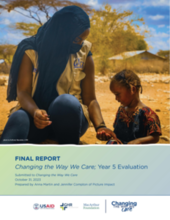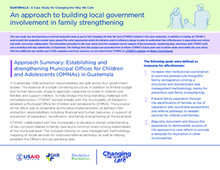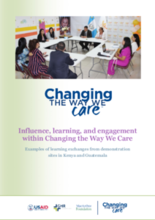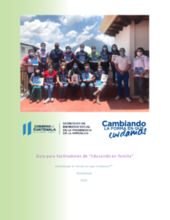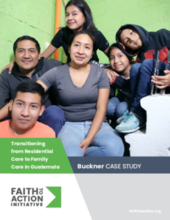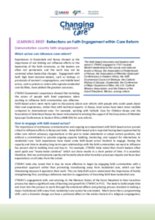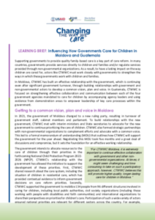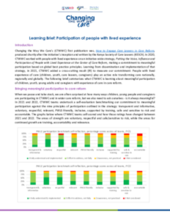This country page features an interactive, icon-based data dashboard providing a national-level overview of the status of children’s care and care reform efforts (a “Country Care Snapshot”), along with a list of resources and organizations in the country.
demographic_data
childrens_living_arrangement
children_living_without_bio
adoption
key_stakeholders
Key Stakeholders
Add New DataOther Relevant Reforms
Add New Datadrivers_of_institutionalisation
Drivers of Institutionaliziation
Add New Datakey_research_and_information
Key Data Sources
Add New DataPrevalence and number of children living in institutional care: global, regional, and country estimates
Reglamento de la Procuraduría de la Niñez y la Adolescencia de la Procuraduría General de la Nación
Revisión del gasto público asociado al cuidado de la niñez y adolescencia en Guatemala (2015 - 2019)
Acknowledgements
Data for this country care snapshot was contributed by a consultant with Maestral International and partners at Changing the Way We Care.
Displaying 21 - 30 of 161
The Final Report: Changing the Way We Care; Year 5 Evaluation highlights the Changing The Way We Care (CTWWC) initiative’s substantial contributions to advancing care reform globally and in demonstration countries—Guatemala, Kenya, and Moldova—through strengthened policies, systems, and stakeholder collaboration.
This case study, part of the five-year evaluation of the Changing the Way We Care (CTWWC) initiative, examines efforts in Guatemala to strengthen child and family protection through local government engagement.
Changing the Way We Care created two opportunities to promote learning and influence the practice of organizations and donors engaged in child protection and care in two demonstration countries: Kenya and Guatemala.
La Guía para facilitadores de “Educando en Familia” es una guía realizada por “Cambiando La Forma en que Cuidamos Guatemala” y está basada en la metodología de Educando en Familia de la Secretaría de Bienestar Social de la Presidencia de la Republica de Guatemala, la guía proporciona herramientas, dinámicas y técnicas para trabajar el programa con grupos de padres, madres y cuidadores; la guía está dirigida a las personas que facilitan el programa o que están certificados para replicarlo por SBS.
The story of Buckner Guatemala’s transition from residential care to family care is told in this recently released Faith to Action case study. The case study details their experience through three stages of transition—learning, preparation and planning, and full transition—with transparency. It addresses common challenges for transitioning organizations, as well as the strategies Buckner took to overcome them.
This learning brief was developed as part of the CTWWC 2021 annual report and shares learning from demonstration countries on how to engage and bring faith actors into care reform.
This learning brief was developed as part of the CTWWC 2021 annual report and shares learning from two demonstration countries, Moldova and Guatemala. It showcases how care reform is led by government and how to influence different government actors.
This learning brief was developed as part of the CTWWC 2021 annual report and shares learning from several contexts and is intended to share learning on how family strengthening, reunification, case management and workforce strengthening can be integrated in care reform.
This learning brief was developed as part of the CTWWC 2022 annual report and shares learning from across different contexts. It is intended to showcase how the transition of care services is happening and how it can be supported.
This learning brief was developed as part of the CTWWC 2022 annual report and shares learning from Kenya, Guatemala and Moldova. It is intended to help other practitioners understand how to bring meaningful participation of people with lived experience into care reform. By people with lived experience CTWWC considers children and youth, care leavers, parents and other care givers who are experiencing the care system in their context.

